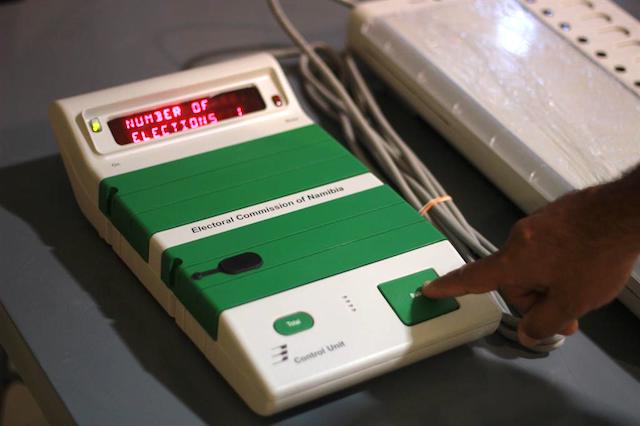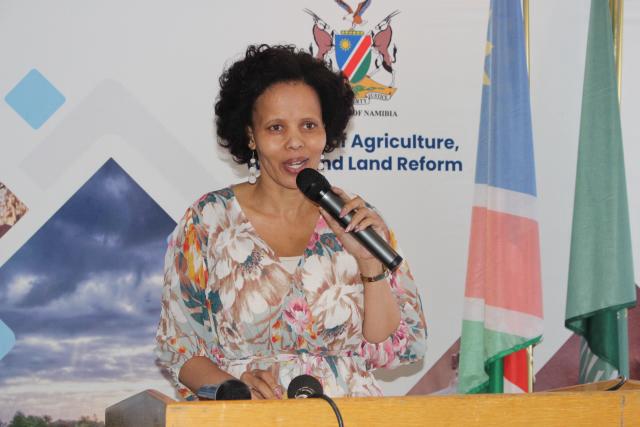THE Electoral Tribunal for the Windhoek district will on Monday decide whether to block the use of the electronic voting machines (EVMs) in the upcoming presidential and National Assembly elections.
Magistrate Uatjo Uanivi yesterday reserved his judgement in a case in which independent presidential candidate Panduleni Itula is challenging the Electoral Commission of Namibia (ECN)’s planned use of the EVMs in the upcoming elections after hearing oral arguments from both parties.
The judgement will be delivered on Monday next week, two days before the elections.
This is just two days before the holding of the presidential and National Assembly elections on Wednesday, 27 November.
The ECN has on numerous occasions maintained that the EVMs will be used at next week’s elections, despite mistrust from some members of the public, opposition parties and candidates participating in the elections.
Itula, who was represented by lawyer Henry Shimutwikeni, wants the Electoral Tribunal to order the ECN not to use EVMs in the upcoming presidential and National Assembly elections.
In his affidavit, he stated that reports of missing EVMs cast doubt on the credibility of the elections.
Itula said as an alternative to the removal of the EVMs from the electoral process, the ECN must be ordered to implement the voters verifiable paper audit trail (VVPAT) to function simultaneously and in conjunction with the EVMs, or to deploy competent technicians to each polling station for verification if the EVMs are to be used.
Another alternative is for the ECN to go back to the manual ballot papers voting system.
Shimutwikeni yesterday questioned how the ECN arrived at the decision to use the EVMs in the elections.
According to him, the Electoral Act of 2014 provides for the ECN to exercise its discretion to use the EVMs, but it is not mandatory that EVMs should be used in elections.
He added that reports about missing EVMs, and contradicting statements made by the ECN, the Swapo Party and the Namibian Police were also reasons enough to cast doubt on the credibility of elections in which the machines will be used.
Itula’s urgent application was supported by Workers Revolutionary Party (WRP) leader Hewat Beukes, who submitted a supporting affidavit, and argued that the ECN was coercing the nation to use the EVMs, despite the noted shortcomings.
Beukes said the fact that the ECN had refused to provide all stakeholders with the specifications of the EVMs shows that the commission was protecting a certain interest.
He claimed that there was concrete evidence that shows how the ECN contravened certain provisions in the Public Procurement Act when it purchased the EVMs from India.
Beukes added that the duplication of registered voters on the national voters register was another reason why Namibians have to doubt the electronic system being implemented by the ECN.
He called the act national abuse by the ECN, since the EVMs’ specifications were not approved by any local standards institution. Beukes was, however, countered by the ECN’s chief electoral officer, Theo Mujoro, who interjected by saying that the WRP leader was talking “rubbish”.
Senior counsel William Mokhare, who represented the ECN, argued that Itula’s case was not urgent, and that it must be dismissed by the tribunal.
He said the applicant failed to make the link between reports about lost EVMs and the urgency of the matter, as well as how it applies to the upcoming elections.
Mokhare submitted that the ECN must not be ordered to appoint independent inspectors for the use of the EVMs because the move could be pre-emptive to suggest that the commission would not adhere to the provisions of the law in terms of the use of the EVMs.
Thus, he reasoned that the allegations made against the EVMs were baseless and irrelevant in the absence of any facts, and due to the fact that when the EVMs were used in the 2014 elections, there were no complaints or challenges that the commission had not adhered to the law.
He added that the case must be dismissed because the specific subsections (section 97 subsection (3) and (4) of the Electoral Act of 2014) which requires the ECN to introduce the VVPAT was not in force.
According to him, it would not be correct for the tribunal to order that the ECN implements section 97 because such powers were only vested in the minister of urban and rural development as the custodian of the law.
Mokhare further submitted that the argument that there was no decision to authorise the ECN to use the EVMs was misguided, and that that decision was taken on 1 August 2014 and communicated to all and sundry and it was published in the , and was never disputed by anyone.
Stay informed with The Namibian – your source for credible journalism. Get in-depth reporting and opinions for
only N$85 a month. Invest in journalism, invest in democracy –
Subscribe Now!










